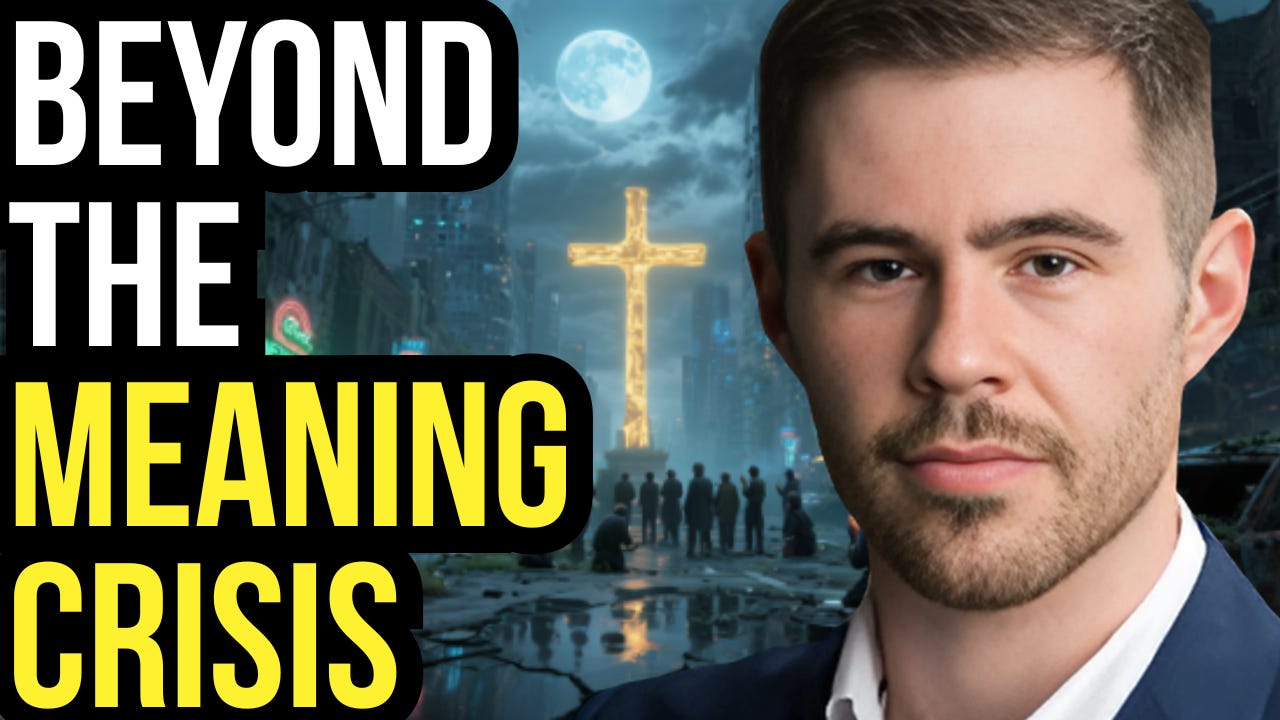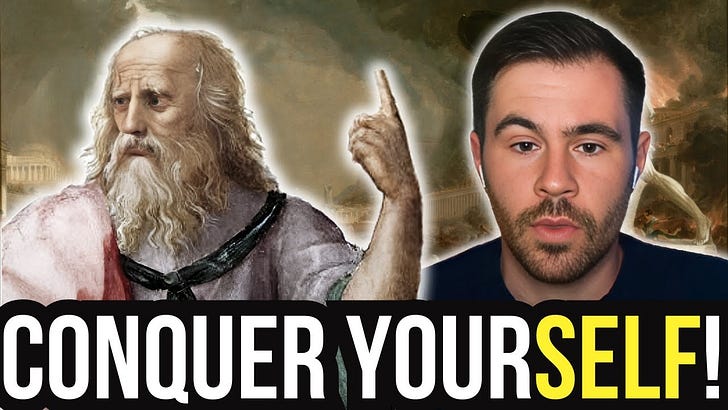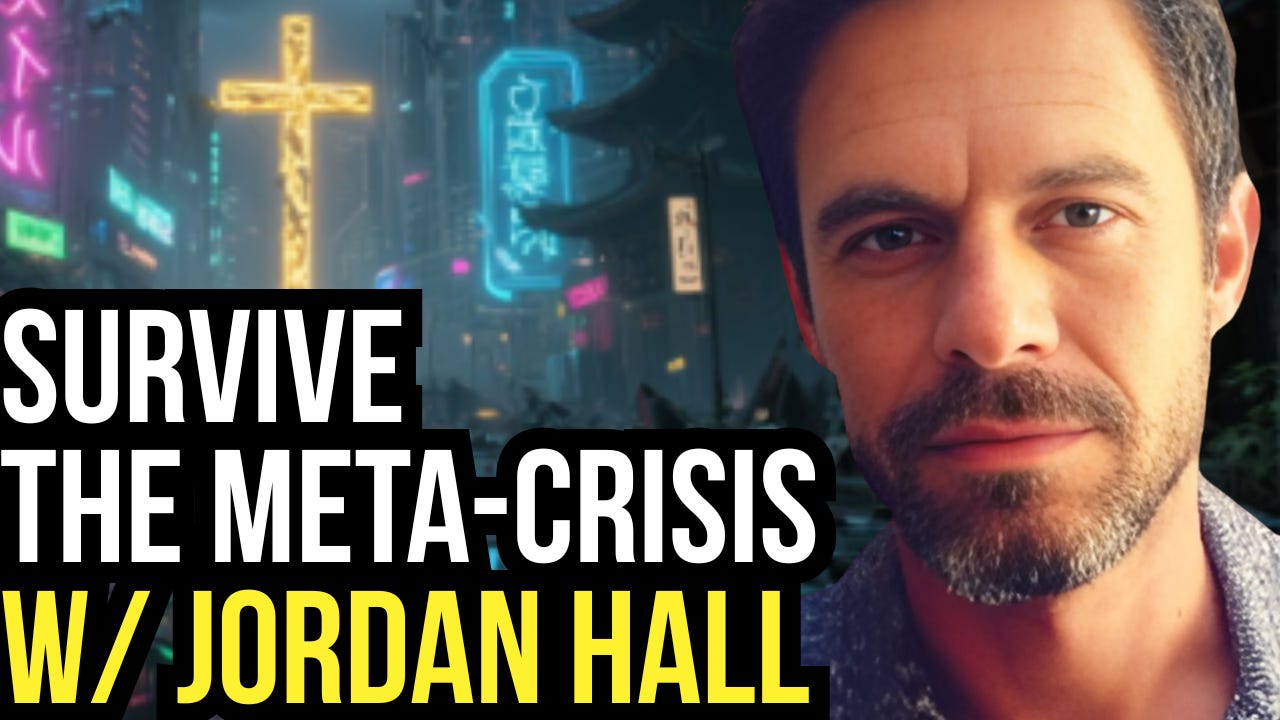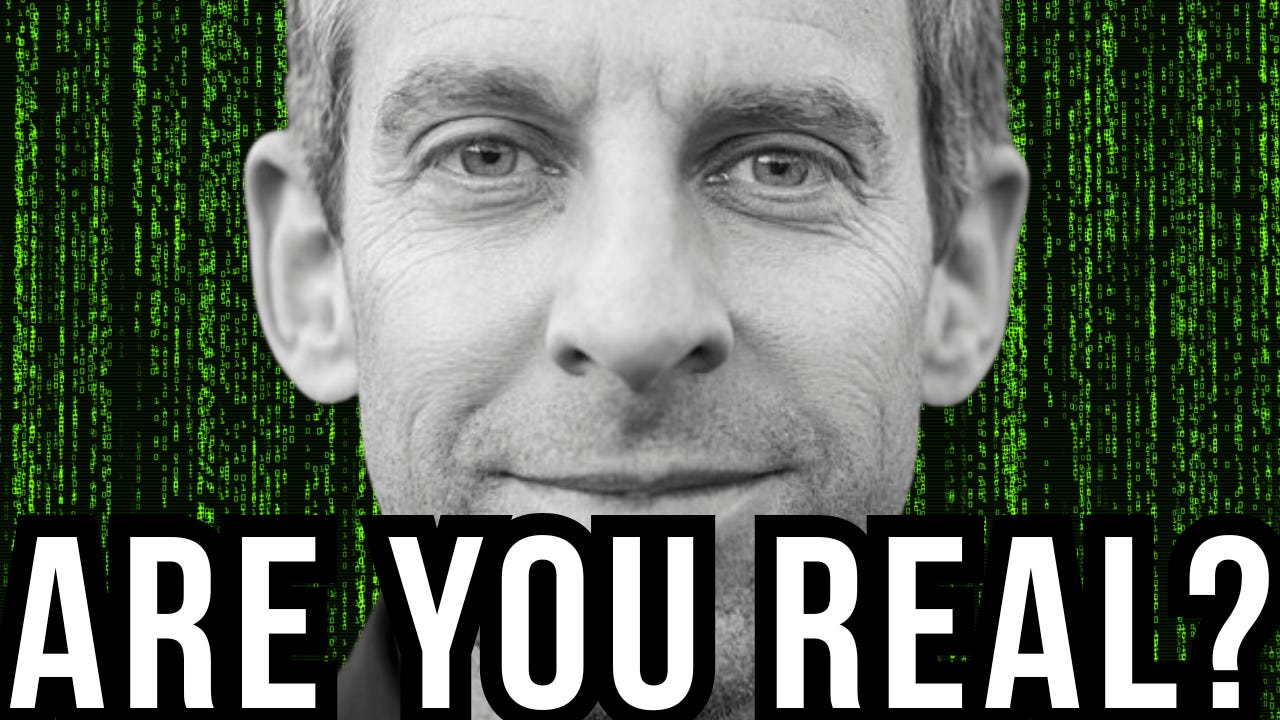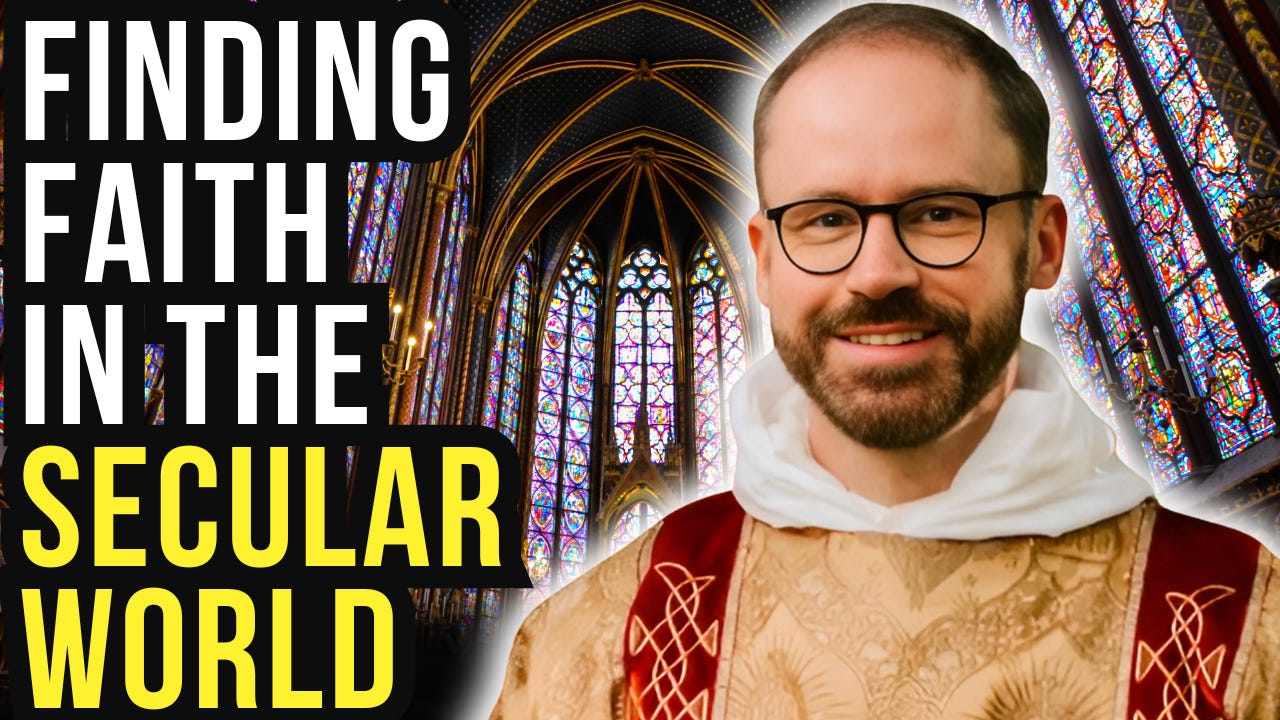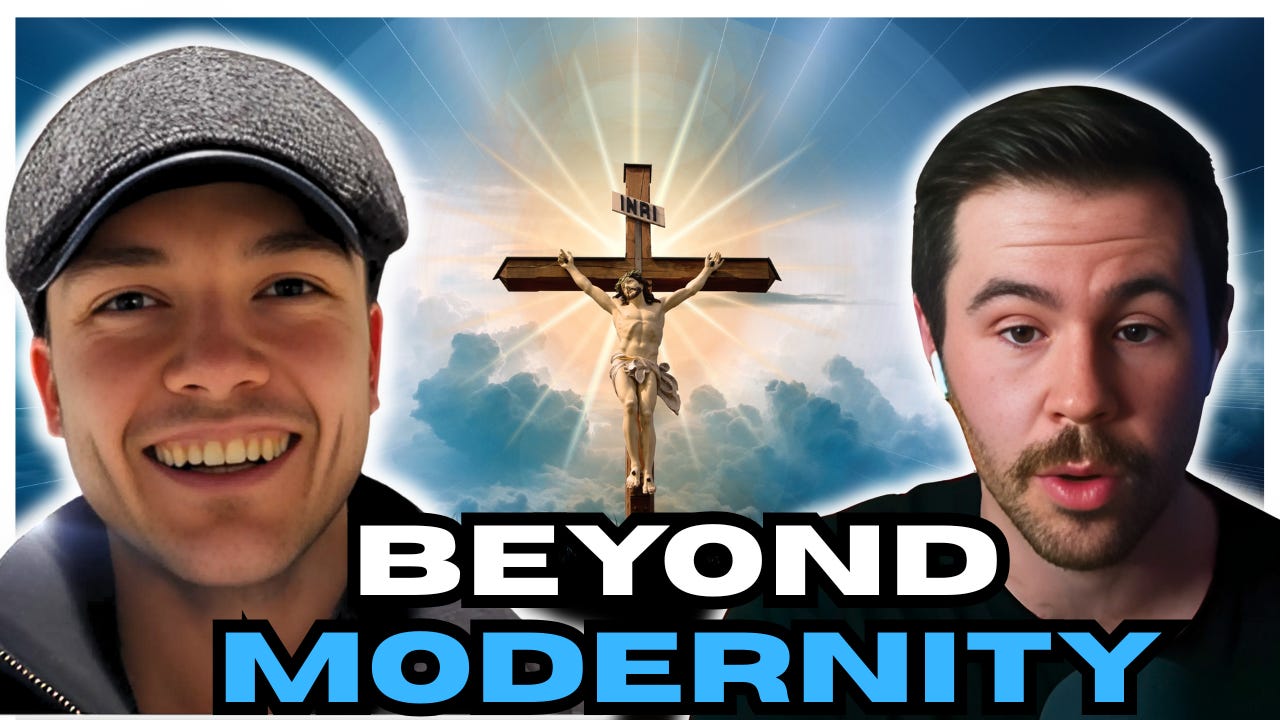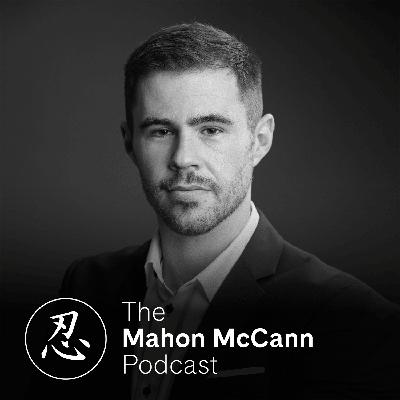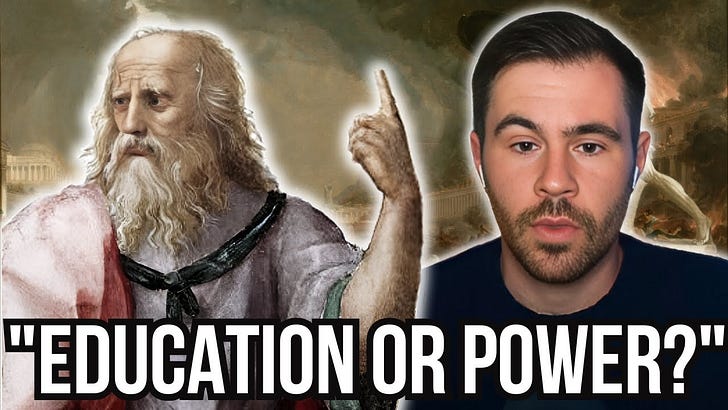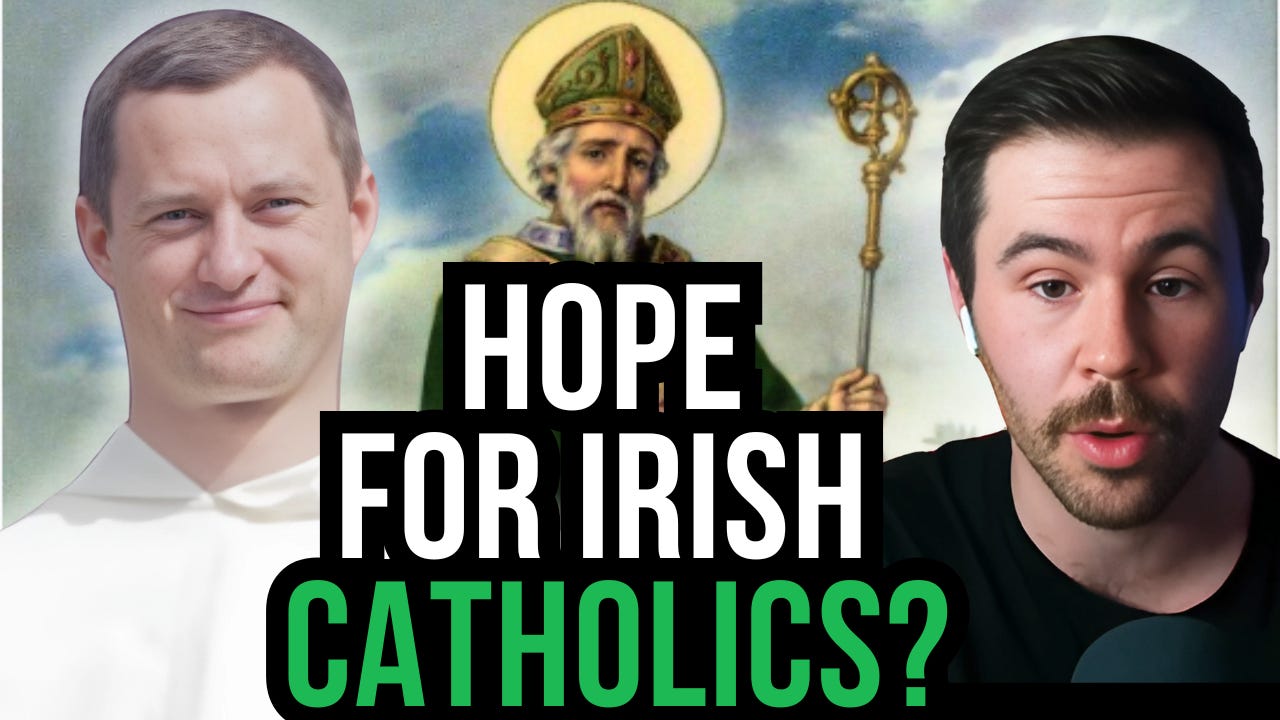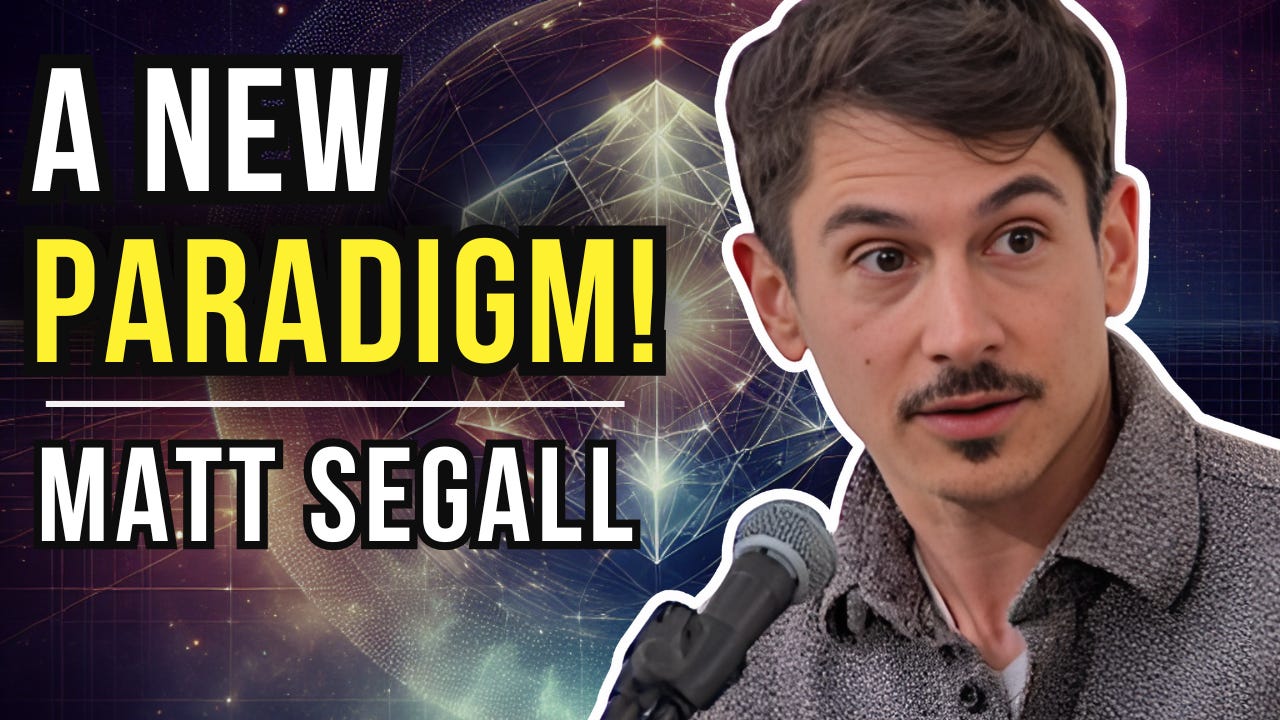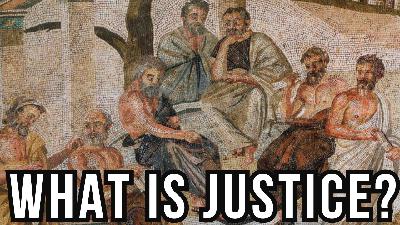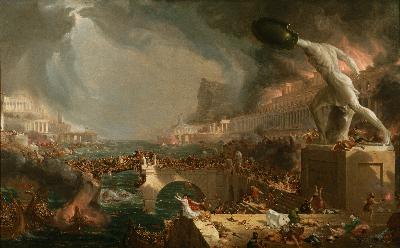Discover Mahon McCann
Mahon McCann

Mahon McCann
Author: Raising the Cross
Subscribed: 5Played: 103Subscribe
Share
© Mahon McCann
Description
"Faith seeking understanding"
Mahon McCann is an Irish philosophy Phd researcher and lecturer, specialising in ethics, philosophy of mind and digital technologies. He is a former atheist and Catholic convert and on this podcast he explores christian solutions to the meaning crisis, philosophy beyond reductive materialism, meaning and manipulation in the machine age and bridging the gap between the secular world and Christendom. Join the Raising the Cross substack to get every episode to your inbox 👇
www.mahonmccann.com
Mahon McCann is an Irish philosophy Phd researcher and lecturer, specialising in ethics, philosophy of mind and digital technologies. He is a former atheist and Catholic convert and on this podcast he explores christian solutions to the meaning crisis, philosophy beyond reductive materialism, meaning and manipulation in the machine age and bridging the gap between the secular world and Christendom. Join the Raising the Cross substack to get every episode to your inbox 👇
www.mahonmccann.com
125 Episodes
Reverse
This video explores the 'Meaning Crisis,' a profound cultural and historical phenomenon affecting mental health and existential stability in the West. Drawing inspiration from John Vervaeke's extensive lecture series and works, we delve into the scientific revolution, materialism, and their impacts on traditional cosmologies and personal worldviews. The discussion highlights key figures like Nicholas Copernicus, Galileo, and Jordan Peterson, analysing their contributions and effects on modern thought. The video also addresses the resurgence of interest in Christianity, proposing that a reclamation of the core Christian structure could solve the ongoing crisis. The conversation touches upon the role of online media in fostering new avenues for faith and community, suggesting a pivotal moment for re-evangelising secular spaces. Talk was given at the Legion of Mary Young Adult Apologetics conference in Dublin, 2025. Disclaimer: the views expressed in the talk are the speaker's own and do not represent any of the thinkers mentioned or John Verveake's original framing of the meaning crisis. Chapters:00:00 Introduction to the Meaning Crisis00:20 John Verveake and the Historical Context02:14 Scientific Revolution and Its Impact03:57 Materialism and Its Consequences05:20 The Mechanical Universe and Nihilism11:27 Reconnecting Morality and Mythology15:57 21st Century Revival and Online Influence21:46 Challenges and Opportunities for Modern Evangelism23:58 Q&A and Personal Reflections Get full access to Raising the Cross at www.mahonmccann.com/subscribe
In the fourth part of our lecture series on Plato's Republic, we delve into Plato's concept of the tripartite psyche and the four cardinal virtues. We explore how the three parts of the psyche—the appetite, the rational self, and Thymos—interact and often conflict with one another, causing inner turmoil. Plato's model is foundational for many subsequent theories in psychology, from Freud to modern generative and predictive processing models. Learn how Plato's notion of justice as psychological integration provides a framework for reducing inner conflict and fostering alignment among the different parts of the psyche, ultimately leading to a more harmonious and connected existence. A good deal of the content from this lecture is inspired by John Verveake's Awakening From the Meaning Crisis Part 5: https://www.youtube.com/watch?v=neDutbcedUY&ab_channel=JohnVervaeke Introduction to the series: https://youtu.be/TZ8_rQNFfLU Chapters 00:00 Introduction to Plato's Republic Lecture Series 00:56 The Appetite: Immediate Desires and Motivations 02:42 Thymos: The Social and Emotional Self 07:54 Consequences of Inner Conflict and Injustice 10:31 Conclusion: The Intrinsic and Consequential Good of Justice Get full access to Raising the Cross at www.mahonmccann.com/subscribe
Jordan Hall is a philosopher, futurist, and recently, a Christian. He played a significant role in the digital media landscape at MP3.com and later as the founder and CEO of DivX, a company instrumental in the online digital video revolution. After this, Hall focused on stopping the “Meta-crisis” and co-founded the Game B movement, seeking alternative societal structures to address systemic challenges. SummaryIn this conversation, Mahon McCann and Jordan Hall explore the concept of the meta-crisis, emphasising its roots in spiritual warfare and the breakdown of modernity. They discuss the implications of digital culture on virtue, identity, and community, advocating for a return to the sacred and the importance of accountability in the digital realm. The dialogue highlights the need for reconciliation among Christians and the transformative power of faith in navigating contemporary challenges.Chapters00:00 Introduction and Context of the Meta Crisis02:45 Understanding the Nature of the Meta Crisis05:46 The Role of Spirituality in Crisis08:49 Virtue vs. Virtue Signaling in the Digital Age12:05 Transitioning from Modernity to Digital Age15:01 Digital Identity and the Commons18:01 The Need for Accountability in Digital Spaces20:55 The Sacred and the Governance of Digital Identity24:09 Reconnecting with the Sacred in a Digital World27:00 The Foundation of Virtue and Relationship with God31:33 The Nature of Virtue and Conviction34:08 Grounding in Relationship with God36:44 The Challenge of Modernity and Faith39:36 Understanding Faith as Relationship43:25 Restoring Meaning and Language47:28 The Weight of Responsibility in Faith51:13 The Process of Growth and Transformation52:51 Navigating the Meta Crisis56:15 The Spiritual Challenge of Growth58:43 Listening to God and Mutual Commitment01:00:05 The Dance of Relationships and Digital Encounters01:03:00 The Challenge of Love and Presence01:05:56 Hierarchy and Leadership in Crisis01:08:55 The Universal Church and Reconciliation01:12:10 The Role of Tradition and Interpretation01:18:01 The Call to Action and Personal Mission Get full access to Raising the Cross at www.mahonmccann.com/subscribe
Colin Deyoung is a personality psychologist, personality neuroscientist, the creator of the Cybernetic Big Five Personality theory and professor of psychology at the University of Minnesota. Adam Safron, Ph. D., is a Cognitive Scientist and psychologist who studies the nature of preferences and motivation from mechanistic, developmental, and evolutionary perspectives. Recently, he has proposed a model of embodied agency and free will and is working on a unified mechanistic account of psychedelics. This conversation delves into the complex nature of the self, exploring its psychological, philosophical, and practical implications. The discussion begins with the distinction between the 'I' and 'me' aspects of self, as articulated by William James, and extends to the illusory nature of self as viewed in Buddhist philosophy. The speakers examine how consciousness functions as a model that shapes our understanding of reality and the self. They also discuss the importance of values in defining identity and the challenges of integrating conflicting goals. The conversation concludes with reflections on the implications of selfhood in the context of artificial intelligence and future developments.Check out the papers: https://journals-sagepub-com.dcu.idm.oclc.org/doi/full/10.1177/10888683221083777Timestamps:00:00 Exploring the Concept of Self07:07 The I and the Me: Understanding Selfhood10:40 Epistemology vs. Ontology: The Nature of Consciousness18:03 Illusions of Self and Consciousness22:45 The Role of Consciousness in Action34:28 Transformations of Self: Continuity and Change36:36 The Nature of Self and Values39:12 Core Values and Personality41:03 Understanding Self Through Values43:58 The Journey of Self-Discovery46:32 Integration and Self-Realization49:22 The Role of Goals in Self-Understanding54:05 AI, Selfhood, and Alignment Get full access to Raising the Cross at www.mahonmccann.com/subscribe
In this conversation, Father Benedict McGlinchey ( @irishdominicans ) shares his journey to becoming a Dominican friar, reflecting on his upbringing in Northern Ireland, the impact of a positive Catholic experience, and the challenges posed by secularism and new atheism. He discusses the importance of intellectual rigor in faith, the revival of interest in spirituality among younger generations, and the need for creating spaces for divine encounters in modern life. The dialogue emphasizes the search for meaning and happiness in a world increasingly detached from traditional religious practices.Chapters:00:00 Journey to Faith: A Personal Background11:06 The Role of Positive Experiences in Faith13:50 Cracks in the Foundation: The Decline of Faith17:29 Political Context and Its Impact on Faith20:01 The Rise of Secularization and New Atheism20:19 Materialism vs. Spirituality: The Celtic Tiger Effect22:07 Transitioning from Law to Religious Life23:40 A Journey of Faith and Illness25:47 Reevaluating Life Choices26:43 Discovering Dominican Spirituality28:35 The Role of Preaching in Modern Faith32:15 The Shift in Cultural Perception of Faith35:05 The Revival of Faith in Contemporary Society40:20 Experiencing the Divine in Modern Life43:31 Creating Spaces for Spiritual ExperienceWant to support the Wisdom Dojo? Consider sharing this post or becoming a patron 👇 Get full access to Raising the Cross at www.mahonmccann.com/subscribe
Jean-Philippe Marceau is a writer and podcaster with an academic background in mathematics, theoretical computer science and philosophy of mind. He is the author of "Post-reductionist Christianity: A Way Out of the Meaning Crisis" published with the Symbolic World Press. He is a regular contributor to the Symbolic World blog and acted as its editor-in-chief for many years since its conception. Get the Book: https://store.thesymbolicworld.com/products/post-reductionist-christianity-a-way-out-of-the-meaning-crisis In this conversation, Mahon McCann and JP explore the themes of reductive materialism, its critiques, and the implications for understanding consciousness, rationality, and the human condition. They discuss the emergence of higher-level properties in science, the role of classical metaphysics, and how these ideas relate to the meaning crisis in contemporary society. The discussion culminates in the assertion that Christianity, particularly through the lens of the Eucharist, provides a solution to the meaning crisis, offering a path back to community and meaning in a world increasingly dominated by materialism. Chapters: 00:00 Introduction to Reductive Materialism 04:48 Flaws of Reductive Materialism 10:13 Arguments Against Reductionism 20:35 Emergence in AI and Science 23:11 Philosophical Challenges to Materialism 28:08 Classical Metaphysics vs. Reductive Materialism 39:54 Anthropology and the Human Condition 43:32 Patterns of Existence and Higher Realities 46:13 The Role of Higher Patterns in Overcoming Sin 49:28 Classical Metaphysics and Its Relation to Christianity 52:28 The Limits of Philosophical Arguments for Christianity 56:21 Zombies as a Metaphor for Materialism 01:02:04 The Eucharist: A Solution to the Meaning CrisisWant to support the mission of the wisdom dojo to provide free education after the meaning crisis? Consider becoming a patron 👇 Get full access to Raising the Cross at www.mahonmccann.com/subscribe
Howiyeee,Got to join Jacob Kishere of the Sensespace podcast and Resonant Man project on his Culture Pilgrim Substack. We discussed the continuing strange return of Christianity and my own conversion to Catholicism. We dive into some other topics including the Meta-Crisis and meaning crisis, psychedelics and transformative practises, the liminal web and performative Christianity! Get full access to Raising the Cross at www.mahonmccann.com/subscribe
This is the third part of a series unpacking Plato's Republic. This episode dives into Book Three, focusing on the critique of Greek literature, the educational program divided into music and physical training, the introduction of the rulers from the warrior class, and the famous 'Noble Lie' that establishes the city's caste system. Discover how Plato criticises the Homeric myths, redefines moral standards, and proposes a structured society with an emphasis on ethical and harmonious living. Chapters 00:00 Introduction to Plato's Republic Series 00:17 Overview of Book Three 04:06 The Role of Imitation in Education 09:55 Selection and Role of the Rulers 11:39 The Noble Lie and Caste System Introduction:Episode 1:Episode 2:Want to support the educational work of the wisdom Dojo? Consider becoming a supporter below 👇Best,Mahon. Get full access to Raising the Cross at www.mahonmccann.com/subscribe
Fr Conor McDonough (@thewhitestone) is a Dominican Friar and Phd Student in the national university of Galway on “The Letters of St Paul in Early Irish Christianity”. He is an educator and communicator of the Catholic faith and frequently features in videos from the Irish Dominicans youtube channel: https://www.youtube.com/@irishdominicansIn this podcast we explore the current state of Irish Catholicism, highlighting its decline in practice and the alienation of many from the church. We discuss the lack of basic knowledge among self-identified Catholics, the impact of scandals on trust in the church, and the absence of beauty in liturgical practices. However, there is hope in the revival of the faith online and particularly among younger generations. We discuss the impact of modern thinkers like Jordan Peterson on the perception of religion, the spiritual awakening of Gen Z, and the search for truth, beauty, and goodness in a secular world. Check it out 👇Chapters:00:00 The Current State of Irish Catholicism02:53 Decline and Alienation from the Church05:53 Cultural Conformity and Choreography Catholicism08:52 The Intellectual Tradition and Lack of Curiosity11:57 The Shift in Attitudes Towards Catholicism14:49 Historical Context of Irish Catholicism18:10 The Impact of Secularization on Faith20:57 Personal Experiences and Conversations about Faith24:05 The Search for Meaning in a Secular Age27:54 The Crisis of Faith in Modern Society29:51 Truth, Goodness, and Beauty in Catholicism32:59 The Impact of Scandals on Faith36:00 Personal Faith Amidst Institutional Failures39:03 Spirituality Beyond Traditional Religion41:50 The Role of Online Communities in Faith44:54 Generational Shifts in Spirituality48:02 Rediscovering Faith in a Digital Age50:59 The Search for Truth, Beauty, and Goodness53:54 The Importance of Community in Faith Practice58:37 The Role of Religious Practices in Modern Society01:00:41 Bridging Divides: The Importance of Community01:02:07 Engaging the Youth: The Church's Response to New Interest01:05:53 Navigating Challenges: The Journey Back to Faith01:08:27 Cultural Reflections: Literature and the Search for Meaning01:12:41 The Quest for Truth: Artistic Expressions of Faith01:16:43 Overcoming Prejudices: The Journey Towards Acceptance01:20:42 Building Community: Resources and Recommendations for Young AdultsBest,Mahon. Get full access to Raising the Cross at www.mahonmccann.com/subscribe
This easter Saturday I will be baptised as a Catholic in Dublin! This baptism is really the fruition of a spiritual journey which has taken my whole thirty years of life thus far, but in this talk I tried to condense that journey into a testimony to share some of the main points along the way. Essentially, all the work on this Substack and the Youtube has been leading up to this decision: Charting the failure of the mechanistic philosophy, the resulting meaning crisis, and the variety of jigs and reels which vie as a replacement worldview to re-home people in the liminal web and beyond. I did for awhile buy into the idea we were going to make ‘something new’, a “religion that is not a religion”. But when I finally understood Christianity and particularly it’s neoplatonic underpinnings, this project seemed entirely unnecessary and to be honest, foolish. Hopefully this talk might be of some use to you on your own spiritual quest, or offer hope for those who worry about the declining fortunes of Christianity and Catholicism (although these seem to be reversing). Unfortunately because the talk was only five minutes, I couldn’t really get into the philosophical nitty gritty of my decision and the rational behind the move. However, over the next few months, and throughout the Plato’s Republic course, I will share a few essays explaining the logic behind my conversion and the many, MANY, blocks which I had to overcome to become a Catholic (and coming from an extreme atheism since birth, I probably had a lot more blocks than most of you!)I’m not advocating a nostalgic return to a perceived christian empire, but rather a taking up of the cross, the profound transformation that is offered by christ, and that this transformation is the way of out of the meaning crisis (or the second fall as the Pageau brothers refer to it). Albeit like me, we all need a lot of explaining and practising and understanding to see how the ancients saw and get over the blocks of the modern mind to re-enter christendom, which I think is the main point of my online platform now - straddling the gap between modernity and christendom with some help from the Greeks. In entering the church and Catholicism, my personal motto is St Augustine’s Maxim of “faith seeking understanding”. I need enough faith in the tradition to offer the time, attention and sacrifices to learn and transform enough to get the understanding. It’s a bit like going to the gym, you don’t get results immediately but if you have faith in the plan and process then the results will follow. But in my limited experience so far, if you look honestly and humbly, the treasures are there to be found: “Ask, and it will be given to you; seek, and you will find; knock, and it will be opened to you. For everyone who asks receives, and he who seeks finds, and to him who knocks it will be opened.” (Matthew 7:7-8)Talk Transcript:“Good morning, my name is Mahon and today I’m going to give you my story. By all rights I shouldn’t be here. I was born as an atheist, was never baptised or made communion or anything. I was a particularly vicious atheist and delighted in telling my friends that “God isn’t real” and that religion is all made up nonsense. As a teenager I listened to the new atheists like Richard Dawkins and Christopher Hitchens and parroted their arguments to anyone who would listen. One time in particular I remember sitting very smugly in religion class in school when the Gideons came with bibles and I was the only one in the class who refused to take one, even though they were free. I was an evangelist for atheism and yet here I am, at the age of thirty, becoming a Catholic? What happened?I was pretty happy in my assumed atheism probably until college. Where I met Friedrich Nietzsche, the German philosopher who famously proclaimed that “God is dead”. Nietzsche worried about the problem of nihilism after the death of God, that life would become meaningless and morality impossible because all would be permitted. Certainly in college my life took on that shape, drinking every weekend to escape the despair and alienation. Nietszche’s solution to the death of god was to become the “ubermensch”, the person who was capable of creating their own values and laws. And I tried that briefly, but quickly ended up totally destroyed from binge-drinking and some life-threatening hangovers. I learned you can proclaim to be a Moral relativist but you can’t ignore the consequences of your actions forever. So Nietszche’s solution didn’t work out for me.Modern philosophy had seemed to only make my problems worse so after college I turned to modern psychology in the hopes of something better, particularly the work of Swiss Psychologist Carl Jung. And Jung had a story about what happened in the west after the so-called death of God, that the scientific revolution had split the world in two, and that this split manifested in the minds of western people like me and you. That we had all become scientifically minded in a way but still acted out morality and rituals which we could no longer justify or understand. We had fallen into a profound cognitive dissonance in the west, and I could feel that in my own struggling journey - unable to believe in God, but not doing so well without him either?It was one insight of Jung in particular that destroyed my lingering atheism for good. He described the Greek Polytheistic Gods as personification of emotions that could possess our minds. For example, Ares, the God of war, was a personification of anger, a powerful evolved sub-personality that could become activated and drive you to do terrible things if you weren’t careful. For some reason, it was like a key turning in a lock and suddenly I could see the meaning of these stories and myths clearly, I could translate them into things which I could understand and which I knew were real and which addressed problems which I was struggling with today. I wondered, if I could understand polytheism in this way, then what about Monotheism? And that one monotheism in particular, I’d say such terrible things about…I like to think if I have one virtue it’s the ability to admit when I’m wrong and the more I studied monotheism, the more I realised I was really wrong. The way I was taught, it was that a big guy with a beard lived in the sky and gave out if you didn’t eat your dinner - a kind of adult santa claus. But the more I studied monotheism through the Greeks in Plato, the Hebrews in the old testament and finally, begrudgingly, the church fathers like Saint Augustine and Aquinas, the more I became convinced this was the greatest philosophy humanity had ever come up with. Ironically, the philosophy of life which I was searching for was in the last place I wanted to look, the Christian tradition…the thought dawned on me, “oh no, maybe I was becoming a Christian…”But I still wasn’t willing to convert, even though I could intellectually justify monotheism now, there was still more to Christianity, like the church and the tradition and of course, Christ himself? How could I reconcile myself to Christ after all the terrible things I said about him? During the time when I was trying to avoid these thoughts, a certain global pandemic came along which didn’t leave room to avoid things anymore. I’ve heard of our confinement in covid described as being trapped in the “involuntary monastery”, and for me that was quite literal. I quit drinking and it felt like a kind of death, a loss of my old self and a clearing away for something new. For the first time, I started to read the bible, which I’d rejected all those years ago, and finally started to connect to the characters like Moses and Job and Christ himself. I could finally feel these stories weren’t something foreign but relatable. In some way, they were my own story.After covid myself and my fiance decided to do the Camino De Santiago, the full 800 km from France to the edge of Spain. Me because I was wrestling with this Christian spiritual journey and for her because she really likes walking. I guess in some ways on that journey I first starting to pretend to be a christian, listening to the New Testament, going to mass and blessings but finally being moved by Christianity and christians, that resistance I had, that critical atheistic voice, just got quieter and quieter until it was gone, and all that was left was joy and peace - I could feel love again, a love like I’d never known existed. A love that came like a friendly extended hand from the sky, one which I definitely didn’t deserve, but which came anyway. It was the first time I ever experienced the Grace of God.As we walked I imagined Christ in front of us, moving between the trees, and I’d catch glimpses of him. I think I wanted to see him face to face always, that’s the atheist dream, to look god in the eye before saying ‘alright I’ll sign the contract!’ But recently I read St Gregory of Nyessa’s book The Life of Moses, and he talks about Moses in Exodus 33:18 when he wants to see God’s face but God will only allow him to see his back. St Gregory said the reason we see God’s back and not his face is because we are meant to follow him. So I decided that I would follow him and he brought me here, to become a Catholic, and to tell people my story, to help them return home, like he did for me.” Get full access to Raising the Cross at www.mahonmccann.com/subscribe
In this conversation, Mahon McCann and Matthew David Segall (@footnotes2Plato) explore the ongoing metaphysical revolution in science, particularly in physics and biology. They discuss the evolving understanding of causality, the philosophical implications of Kant and Plato's ideas, and the significance of the good as a foundational principle for knowledge. The dialogue culminates in a discussion on truth as participation, emphasizing the interconnectedness of human understanding and the universeFull video 👇Chapters00:00 The Metaphysical Revolution in Science06:29 The Role of Causality in Biology12:23 Kant vs. Plato: Epistemology and Reality19:48 The Nature of Formal Causality26:03 The Good as the Foundation of Knowledge32:22 Truth as Participation in Reality36:12 The Nature of Truth as an Event39:06 Truth and Participation: A Transformative Journey40:30 The Virtue of the Knower in Truth Seeking44:06 Microcosm and Macrocosm: Understanding Our Place in the Universe50:44 Causality: Efficient vs. Final Causes in Philosophy01:06:34 Co-Creating Truth: Trust and TransformationWant to support the Wisdom Dojo? Consider sharing this post or becoming a Patron 👇Best,Mahon. Get full access to Raising the Cross at www.mahonmccann.com/subscribe
In this third instalment of the series on Plato's Republic, we will be diving into Book 2 of The Republic! The lecture explores the foundational questions posed by Glaucon and Adeimantus about the nature of justice and its value compared to injustice, Glaucon's myth of 'the ring of Gyges' and its implications on human behaviour are discussed, along with the comparison to Tolkien's narrative in 'The Lord of the Rings'. The video also examines the formation of the ideal city, Kallipolis, as an analogy for justice and the psyche. It concludes with insights into the educational program for the guardian class and Plato's critique of poets like Homer. Watch the video below for a deep dive into one of philosophy's most enduring texts 👇 Timestamps: 00:00 Introduction and Course Overview 00:25 Main Themes of Book Two 01:12 Glaucon's Challenge and the Nature of Goods 03:10 The Ring of Gyges and Ethical Relativism 10:34 The Ideal City and the Role of Guardians 19:06 Education and the Role of Stories 23:34 Conclusion and Next StepsIntroduction episode:Book One: Get full access to Raising the Cross at www.mahonmccann.com/subscribe
This might be my favourite podcast of all time, no messing around!Dc Schindler has returned for the third time and we are discussing Plato’s critique of the images in the Republic and particularly how this applies to the internet and modern digital culture? Daring to ask the question, has the internet literally put us in Plato’s Cave? We discuss the nature of truth and manipulation in world ever increasingly dominated by images, being trapped inside a scientistic tyranny, and how we can escape the cave and return to standing on solid ground with the Platonic conception of reality as “the good”. A lot of the discussion is based on DC’s brilliant book “Plato’s Critique of Impure Reason” (which I highly recommend)Check out the full video conversation (ironically in moving images…) 👇Chapters00:00 Plato's Critique of Images11:21 The Digital Cave and Modern Society18:08 Manipulation and the Search for Truth27:30 Ego-Centrism to Good-Centrism33:18 The Nature of Transcendence and Imminence35:02 Navigating the Cave: Plato's Allegory and Virtue Ethics37:49 The Pursuit of Virtues: Grace and Ideal Excellences41:50 Understanding Forms: The Reality Beyond Physical Objects46:42 The Role of Images: Idols vs. Icons in Perception51:53 The Challenge of Digital Reality: Navigating the Internet's Influence01:01:30 Finding Footholds: The Search for Meaning in a Digital AgeWant to support the mission of the Wisdom Dojo to provide free philosophical education at the end of the meaning crisis? Consider becoming a patron below 👇Best,Mahon. Get full access to Raising the Cross at www.mahonmccann.com/subscribe
Dr Peter Larsen is a lecturer in Philosophy at Dublin City University, specialising in ancient philosophy and particularly the cognitive psychology of Plato and Aristotle. In this conversation, we discusses Plato's Timaeus, exploring its themes of cosmology, the nature of the cosmos, and the relationship between natural science and ethics. We emphasizes the importance of understanding both divine and necessary causes, the role of the forms, and the overarching concept of the good in Plato's philosophy. We delve into the intersections of philosophy, science, and causation, exploring the contemplative tradition, the limitations of physicalism, and the role of teleology in understanding reality. They discuss the aims of science, the insights of Plato and Berkeley, and the implications of causation on free will and determinism, ultimately questioning the completeness of scientific explanations in light of philosophical inquiries. Chapters: 00:00 Introduction to Plato and the Timaeus 06:11 Exploring the Nature of the Cosmos 12:53 Divine and Necessary Causes in Natural Science 20:11 The Forms and Their Relation to Physical Reality 30:34 The Good and Its Role in Understanding Reality 35:36 Exploring the Contemplative Tradition 36:22 The Aim of Science: Beyond Physicalism 39:43 The Limits of Physicalist Natural Science 41:49 The Role of Regularities in Understanding Reality 42:19 Berkeley's Insights on Causation 45:10 Causal Hierarchies and the Divided Line 48:29 Constraints and Causality in Science 50:11 Teleology and Causation: A Philosophical Inquiry 53:11 Revisiting Plato's Causation in Modern Contexts 57:41 Understanding Causation: Necessary vs. Divine 01:01:30 The Debate on Determinism and Free WillWant to support the mission of the Wisdom Dojo to provide philosophical training for the digital age? Then consider sharing this post or becoming a supporter below 👇Best,Mahon. Get full access to Raising the Cross at www.mahonmccann.com/subscribe
In this episode, we delve into Book 1 of Plato's Republic. The focus is on understanding what justice is not, through detailed analyses of dialogues and key themes. From Socrates' descent to the Piraeus symbolizing a philosophical journey into the world of appearances, we examine the contrasting definitions of justice provided by Cephalus, Polemarchus, and Thrasymachus. The philosophical tension between power, wisdom, and the ultimate purpose of justice is explored, setting the stage for a deeper inquiry in Book 2.Chapters:00:00 Introduction to Plato's Republic00:04 Structure of the First Dialogue00:14 Socrates' Descent to the Piraeus01:55 Encounter with Polemarchus06:45 Part Three: Polemarchus' Definition of Justice07:49 Socrates' Counterarguments10:10 Part Four: Thrasymachus Enters the Scene11:05 Thrasymachus' Definition of Justice13:41 Socrates vs. Thrasymachus18:15 The Conclusion of Book OneWant to support the mission of the Wisdom Dojo to provide philosophical training for the digital age? Then consider sharing this post or becoming a supporter below 👇Best,Mahon. Get full access to Raising the Cross at www.mahonmccann.com/subscribe
Donald is a Scottish-born cognitive-behavioral psychotherapist and author, known for his work in integrating modern cognitive-behavioral therapy with Ancient Greek and Roman philosophy, particularly Stoicism. He is the CEO and founder of the Plato’s Academy Center in Athens and the author of several best-selling books such as “How to Think Like a Roman Emperor” and “Stoicism and the Art of Happiness”.His latest book “How To Think Like Socrates” is the best book I’ve ever read on Socrates! It’s a delightful blend of biography, novel, philosophy and psychology and as Donald said, it’s the book he wishes he had about Socrates growing up and I’m very glad that he has written it. Highly recommend picking up a copy if you are interested in philosophy, history, psychology or just fancy a good read:https://www.amazon.co.uk/How-Think-Like-Socrates-Philosophy/dp/1250280508In this conversation, we discuss the relevance of Socratic philosophy in today's world, particularly in the context of modern democracy and social media. Donald emphasises the importance of the Socratic method as a form of dialogue that serves as a therapeutic tool for self-knowledge and understanding biases. The dialogue emphasizes the importance of cognitive flexibility, the dangers of rigid thinking, and the need for a nuanced approach to self-help advice, ultimately advocating for a Socratic approach to learning and understanding.Watch the full conversation 👇https://youtu.be/DztbWigcO-UChapters:00:00 Socratic Inspirations: A Journey Through Philosophy10:20 The Socratic Method: Dialogue as Therapy20:44 Socrates and the Athenian Democracy: A Timeless Relevance30:14 Social Media and the Modern Sophists: A New Age of Rhetoric41:50 The Impact of Social Media on Perception43:25 The Importance of Critical Thinking45:50 Socratic Method and Its Relevance Today48:09 Socrates: A Model of Courage and Wisdom50:57 Reinterpreting Socratic Dialogues for Modern Readers54:31 The Role of Self-Help Literature in Personal Development57:50 Cognitive Flexibility and Its Importance01:01:10 The Dangers of Rigid Thinking01:03:45 Navigating Self-Help Advice Wisely01:08:01 The Socratic Approach to Learning and UnderstandingWant to support the mission of the Wisdom Dojo to provide philosophical training for the digital age? Then consider sharing this post or becoming a supporter below 👇https://www.mahonmccann.com/subscribe?gift=true Get full access to Raising the Cross at www.mahonmccann.com/subscribe
The first lecture of the Plato's Republic course.This will be the first of eleven lectures, the following lectures tracking each of the ten books of the Republic 🏛️This lecture is an introduction to Plato and his Republic through the lens of John Vervaeke’s concept of a Meaning Crisis.Expect to learn about:👉 Plato's context: the Peloponnesian war, natural philosophers and the Sophists.👉 The Meaning Crisis from @johnvervaeke and how the fall of golden age Athens is similar to the modern age👉 Why the meaning crisis fuels existential issues, the mental health crisis and the rise of pseudo-religious ideologies👉 How Socrates, Plato and Aristotle offer a solution to the meaning crisis through the pursuit of wisdom and rationalityThis lecture and lecture series draws will draw on important secondary works on Plato such as "Plato's Critique of Impure Reason" by DC Schindler, The Awakening From the Meaning Crisis series by John Verveake and Michael Sugrues's YouTube lectures on Plato.If you’re picking up a copy of the Republic recommend getting the G.M.A Grube edition (edited by CDC Reeves) or the Allan Bloom translationChapters:00:00 Introduction to Plato's Republic00:46 The Historical Context of Plato's Republic02:31 The Rise of the Sophists03:55 The Meaning Crisis in Ancient Athens04:29 The Modern Meaning Crisis08:53 The Greek Solution: Socrates and Plato09:43 Socrates' Life and Philosophy15:11 Plato's Life and Legacy16:32 Interpreting Plato's Dialogues19:24 Conclusion and Next StepsThe next lecture will be available towards the end of February. If you want to support the provision of free philosophical education and transformation, consider becoming a supporter, sharing the dojo with a friend or leaving a comment👇 Get full access to Raising the Cross at www.mahonmccann.com/subscribe
Brandon Griggs is the author of the Tech For Life Substack (check it out here https://www.techforlife.com/) exploring the central question: How do we get good at godlike technology?In this podcast, we delve into the multifaceted relationship between technology and society, exploring the ethical implications of digital advancements, the challenges faced by digital natives, and the necessity for a universal ethical framework. The conversation emphasizes the need for a deeper understanding of the digital landscape and the role of community in shaping ethical norms.Chapters:00:00 Exploring Technology's Impact on Humanity06:42 The Accidental Nature of Technology12:43 Navigating Between Digital and Non-Digital Worlds18:43 The Challenge of Emotional Literacy in a Digital Age24:21 Active Inference and Digital Behavior30:23 The Future of Ethical Education in a Digital World40:18 Contextual Understanding in Digital Spaces45:38 Business Incentives and Algorithm Control52:10 Trial and Error in Digital Infrastructure57:40 Planetary Scale Computation and Governance01:03:54 Ethics and Technology in a Complex WorldWant to support the Substack? You can become a paid subscriber below 👇https://www.mahonmccann.com/subscribe?gift=trueBest,Mahon. Get full access to Raising the Cross at www.mahonmccann.com/subscribe
Ben graduated from the University of Edinburgh’s flagship Mind, Language, and Embodied Cognition MSc. He is a Leverhulme-funded PhD candidate at the University of Sussex under Andy Clark's mentorship, where his research focuses on neuroscience and digital technology.Read Ben's research hereSummaryIn this conversation, we explore the concept of the meaning crisis, its implications for human agency, and the role of technology in shaping our understanding of meaning. We also discuss how active inference provides a framework for understanding the relationship between individuals and their environments, particularly in the context of education and technology. The conversation delves into the challenges posed by social media and addiction, emphasizing the need for a more nuanced approach to technology that fosters genuine meaning and well-being.Timestamps:00:00 Exploring the Meaning Crisis09:23 Defining Meaning and Its Dimensions17:57 The Role of Technology in Meaning29:41 Education, Agency, and Active Inference41:04 Adaptive Technology and Its Implications52:26 Addiction, Agency, and Meaning01:03:10 The Future of Technology and MeaningSome key takeaways* The meaning crisis is a developmental crisis that affects our ability to find meaning in life.* Active inference offers a framework for understanding how agents interact with our environments.* Technology can both scaffold and diminish our sense of agency.* Education systems need to cultivate character traits that support meaningful living.* Addiction often arises from a lack of meaning, leading to short-term pleasure-seeking behaviors.* Gamification in technology can lead to a loss of genuine engagement and meaning.* Design strategies for technology should prioritize sincerity and transparency.* The relationship between agency and technology is complex and requires careful consideration.* Meaning can be found in both virtual and physical environments, but the nature of that meaning may differ. Get full access to Raising the Cross at www.mahonmccann.com/subscribe
Alicia Juarrero is President and co-founder of VectorAnalytica, Inc., and Visiting Research Scholar at the University of Miami. She is the author of Dynamics in Action (MIT Press) and recently, Context Changes Everything: How constraints create coherence (2023). Grounding her work in the problem of causation, Alicia challenges previously held beliefs that only forceful impacts are causes. Constraints, she claims, bring about effects as well, and they enable the emergence of coherence.Get the book 👉 https://www.amazon.com/dp/0262545667/Summary:In this conversation, we discusses 'Context Changes Everything' and the dismissal of context in philosophy. She highlights the role of context in intentions, behavior, identities, and more. Juattero explains how the reductionist worldview and the focus on bottom-up causality have led to the neglect of top-down causality and the inability to understand coherent wholes. She explores the importance of understanding wholes as emergent properties and the need to rethink ontology and epistemology. The conversation also touches on topics like artificial intelligence, evolvability, and the limitations of the mechanistic metaphor for the mind.Full podcast 👇https://youtu.be/a14Q1-q-NP8Timestamps:00:00 Introduction and Framing03:05 The Dismissal of Context in Philosophy08:47 The Neglect of Top-Down Causality15:00 Rethinking Ontology and Epistemology21:01 The Limitations of Artificial Intelligence22:59 The Failure of the Mechanistic Metaphor for the Mind35:05 Imagination and Coordination41:42 Ethics and Constraints49:06 The Interface between Principle and Practice54:07 The Attentional Infrastructure Get full access to Raising the Cross at www.mahonmccann.com/subscribe
Comments
 United States
United States

